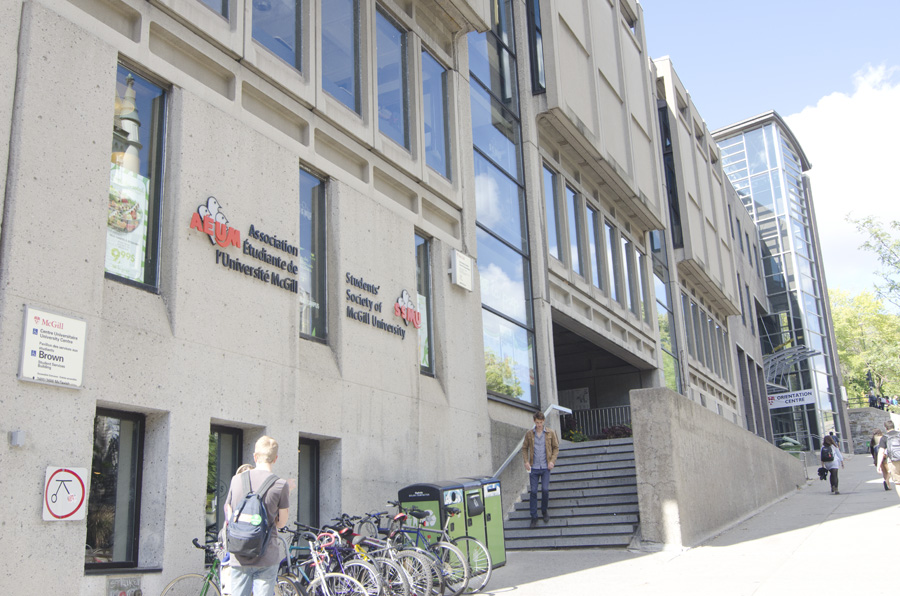The Students’ Society of McGill University (SSMU) has signed the lease for the SSMU Building, following nearly three years of negotiations with the administration.
The Board of Governors (BoG) approved the decision at their Feb. 27 meeting. SSMU had previously been operating in the building without a legal agreement since its previous lease expired on May 31, 2011.
According to Deputy Provost (Student Life and Learning) (DPSLL) Ollivier Dyens, the new lease is for 10 years, covering the two previous years, the current year, and seven more years until May 2021. The new lease stipulates that SSMU share utility costs of the building with McGill, as they previously were not paying the energy costs.
The current lease is $126,900 per year for 2011-2013 and increases by $5,000 every year to a maximum of $165,000 in 2020-2021. SSMU will also contribute $100,000 to the energy costs of the building every year, allowing for adjustment for inflation.
Dyens said SSMU owes outstanding payments to the university for the previous three years.
“[It is the] same as with collective action with unions—you work with the previous agreement until a new one is reached, and then work out retroaction that needs to be done,” he said.
Dyens added that the long term of the new lease could have positive results for the society.
“SSMU can focus energies less on legal issues and more on student services,” he said. “It will also allow SSMU to plan forward for a long time, with their budget [and] fees.”
However, students will face a potential fee increase to account for the lease in the upcoming Winter Referendum, according to SSMU Vice-President Finance and Operations Tyler Hofmeister. The fee would be $6.08 for full-time students and $3.04 for part-time students, and would be indexed to increase at a rate of 5.6 per cent each year.
SSMU President Katie Larson said the negotiations were improved this year due to SSMU’s requirement that the DPSLL be present at the negotiations, rather than a proxy.
“Having a more clear line of communication definitely made it easier to come to agreements,” Larson said. “It is clear to me that being able to talk to the DPSLL directly made it easier to get SSMU’s concerns and points across, since they were not going through a third party.”
Hofmeister commended the ability of the SSMU executives to conclude the negotiations.
“[This is the result of] the diligent work of the SSMU executives—not just from this year but from the previous years as well,” he said. “We have built on the work of the previous executives to complete this agreement.”
Federal budget
The meeting also included a discussion of the 2014 federal budget, which was announced on Feb. 11 by Canadian Finance Minister Jim Flaherty.
Principle Suzanne Fortier praised the budget.
“[It is a] very good budget for the university sector,” she said.
The budget created the Canadian First Research Excellence Fund, which would invest $50 million in university research in 2015-2016, an amount which will eventually increase to $200 million during its 20 year schedule.
Additionally, the budget allocates $15 million for the Natural Sciences Engineering Research Council of Canada (NSERC) and $15 million for the Canadian Institutes of Health Research (CIHR).
Fortier said the allocation of funds to increase the number of opportunities for student and postdoc internships was “greatly appreciated.”
International and out-of-province student tuition
Fortier also explained the federal government’s proposal to reduce its investment for grants for international and out-of-province student tuition, although the details of the proposal have not yet been revealed.
As plans are in preliminary stages, board members only briefly discussed possible responses to proposed changes.
Jonathan Mooney, Secretary-General of McGill’s Post-Graduate Student’s Society (PGSS), highlighted the legal challenges involved in modifying the tuition for international students.
“Changing the tuition that students from francophone countries pay would involve changing the bilateral agreement Quebec has with these countries,” he said.
McGill Vice-Principal (Communications and External Relations) Olivier Marcil, said the Quebec government’s response to the issue had not been finalised.
“It’s not clear under which ministry this reflection will take part, [but] I suspect it will be under the authority of [the ministries of] finance, international relations and higher education,” he said. “McGill has already said that [it] wants to be a part of this discussion because we have a lot of expertise on [this issue].”
Building and Property Committee approval policy
Peter Coughlin, the new chair of the Building and Property Committee, presented the committee’s new method of approving building projects to the BoG.
“Before, we approved projects on a one-on-one basis [.…] projects often came in too early, in the stage before appropriate planning was done and adequate funds were calculated,” Coughlin said. “We want to ensure that the projects are done as efficiently and cost-effectively as possible. We’ve provided admin the seed money to hire consultants for projects so we have a firm number on what they’ll cost.”
The new schedule for project approval includes the implementation of high priority projects that had undergone prior consultation, most of which involve deferred maintenance work. Coughlin said $120 million would be allocated for 10-12 projects, which would be carried out over 18 months.
One such project is the renovation of a service tunnel that runs under the Montreal Neurological Institute, the Duff Medical Building, residence buildings, and the athletic complex.
“The tunnels are really old and would not be serviceable if we had a steam leak,” Coughlin said. “Replacing the tunnels is a high priority.”
The BoG passed the Building and Property Committee’s proposal to carry out the deferred maintenance projects.










Pingback: Gerts, Student Run Cafe, and services jeopardized by University Centre Fee referendum failure | McGill Tribune
Pingback: SSMU ‘outreach’ on building fee yet another abdication of duty | McGill Tribune